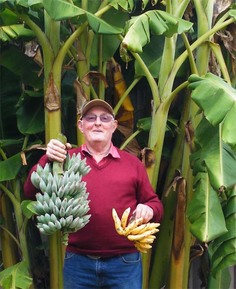COLIN Willmott is no stranger to these cosmic pages; he has been here twice before. Linda Gordon wrote of his prowess as a banana grower in her column The Compost under the heading A taste of the tropics.
Nothing very earth shattering about that you may say, except that Colin grows his bananas in the rolling hills of Glen Alvie.
Our editor followed up the next week with a report informing us that once again he had won first prize for the best Welsh leek at this year’s Wonthaggi Easter Flower and Vegetable Show.
I asked myself what manner of man is this who can achieve such gardening diversity. Best I phone for an interview and go see for myself.
So on this almost final day of autumn I am sitting in the Willmott kitchen with Colin and his wife, Pam, listening to the banana story and much more. Colin, I soon realise, is a born story teller.
He was born and raised in Glen Alvie, where his parents settled in 1920. His present-day property was purchased back in 1936 from the well-known Chitty family of Caulfield. I recall the name well, as I once lived around the corner from their timber yard.
The farm is now run as a Limousin beef cattle stud. Colin looks much more a cattle man than a banana grower. Banana growing is just one of his success stories. Four years ago he exhibited a pumpkin at Wonthaggi that weighed 153 kilograms and back in 1968 a swarm of bees landed in his mail box so he became a beekeeper with 35 hives, won first prize at the Royal Melbourne with a score of 99.75 (I assume for his honey not for one of his bees).
As we drive down to view his banana tree, the story of the tropical migrant’s origin unfolds.
The parent tree was growing at nearby Korrine when his young daughters, Sharon and Leesa, brought home stock for planting. Colin and his neighbouring brother-in-law, David, took “pups from this tree” and put them in their gardens.
Now Colin’s tree towers above the roof of the sheltering shed and a large bunch of green bananas hang from high above. There is a shelter belt of cypresses to the north-east but one has fallen, leaving a toothless gap. “It’s the cause of the wind-swept look,” Colin says, almost apologetically. “Banana trees don’t take kindly to wind but respond well to watering and rich soil.”
Next we inspect the tree in David’s garden to prove this is not a freak of nature. This specimen is marginally smaller but the banana bunch is larger. I am surprised to learn that there is only the one bunch grown on each tree. After that, the tree dies and makes way for a new one.
Next I am taken to view a spectacular aviary covering an area the size of two tennis courts. There is the most colourful and ornamental array of fowls, especially pheasant breeds of amazing colours and markings, along with Colin’s favourites, some beautiful Chinese Mandarin ducks.
He then takes me on a guided tour of his property. Limousin cattle had a reputation for being difficult to handle but selective breeding has mostly bred the wildness out of them, he says. “Now we have cattle out here you can walk up to in the paddock and scratch their backs.” The truth of this statement is confirmed when we come up to a mob of apricot-coloured heifers sheltering under trees. They take no heed of us despite Colin’s efforts to arouse them.
Our next stop is just a short way down the road to visit Sharon Oates, one of Colin’s and Pam’s four daughters. Sharon and her sister Leesa were in Newhaven College’s first intake of 80 students back in 1981, says Colin.
Entrepreneurial in her own right, Sharon runs a herd of Wagyu cattle and when I visit is in the high-tech process of flushing embryos that will be stored in liquid nitrogen and later transferred to recipient cows. This enterprising woman also supervises the slaughter of Wagyu cattle and arranges the packaging and shipment of beef to overseas markets.
As I move to depart, Colin tells me additional tales of family involvement. It comes to light that they are devotees of game fishing, although this seems to be more the successful domain of Pam and Sharon.
Sharon fishes the waters of New Zealand annually and holds a world and a New Zealand record. Pam, who travels to the waters of Bermagui in NSW, has two Australian records. “Held them for quite some time now, I think,” Colin says: “a 41kg yellow fin on an 8kg line, took her three hours to land, and a 144kg thresher shark on a 24kg line.”
As I drive out two hours later (I was planning on a 30-40 minute banana interview) I ponder on the tales that must exist behind so many of these farm gates and recall the closing words of a long-gone TV series: “The city has a million stories; this has been one of them.”


 RSS Feed
RSS Feed